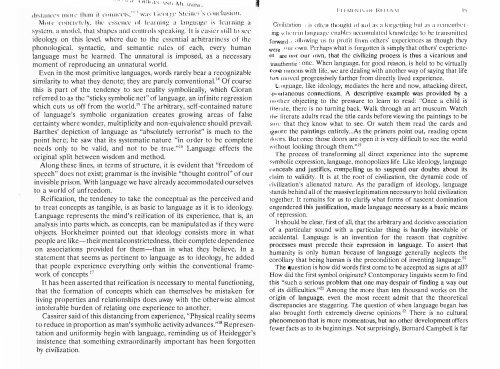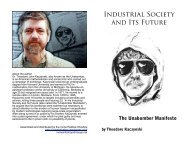CONTENTS - ouroboros ponderosa
CONTENTS - ouroboros ponderosa
CONTENTS - ouroboros ponderosa
Create successful ePaper yourself
Turn your PDF publications into a flip-book with our unique Google optimized e-Paper software.
"<br />
• • '<br />
I' Ij- \ Irl( , 1 " '1 \!\iJ 1 1\ 1 1 \ N ""It ,<br />
('1 )ll/ln'IS,'" \ W;I,\ (;n II " l' StcilH" 'S l"I H\('l usiOIl,<br />
1\1 n J'l' ("'OlltTl'kly. Iltl· (.'SSt'IH.:c.: ur learllillg a \;lHgllal' is learning a<br />
system. a Illodel, that shapcs and controls spcaking. I t is casicr still tt) Sl'l'<br />
ideology on this level. where due to the essential arbitrarincss of Ihe<br />
phonological. syntactic, and semantic rules of each, every human<br />
language must be learned. The unnatural is imposed, as a necessary<br />
moment of reproducing an unnatural world.<br />
Even in the most primitive languages, words rarely bear a recognizable<br />
similarity to what tht:y denote; they are purely conventional." Of course<br />
this is part of the tendency to st:e reality symholically, which Cioran<br />
referred to as thl:: "sticky symholic net" of language, an infinite regression<br />
which cuts us off from the world.1< The arbitrary, self-contained nature<br />
of language's symbolic organization creates growing areas of false<br />
certainty when; wonder, multiplicity and non-equivalence should prevail.<br />
Barthes' depiction of languagc as "absolutely terrorist" is much to the<br />
point here; he saw that its systematic nature "in order to be complete<br />
needs only to be valid, and not to be trllt:."16 Language effects the<br />
original split between wisdom and method.<br />
Along these lines, in terms of structure, it is evident that "freedom of<br />
speech" docs not exist; grammar is the invisible "thought control" of our<br />
invisible prison. With language we have already accommodated ourselves<br />
to a world of unfrcedom.<br />
Rcificarion, the tendency to take the conceptual as the perceived and<br />
to treat concepts as tangible, is as basic to language as it is to ideology.<br />
Language represents the mind's reification of its experience, that is, an<br />
analysis into parts which, as concepts, can be manipulated as if they were<br />
objects. Horkheimcr pointed out that ideology consists more in what<br />
people are like-their mental constricted ness, their complete dependence<br />
on associations provided for them-than in what they believe. In a<br />
statement that seems as pertinent to language as to ideology, he added<br />
that people experience everything only within the conventional frame<br />
work of concepts '"<br />
It has been asserted that reification is necessary to mental functioning,<br />
that the formation of concepts which can themselves be mistaken for<br />
living properties and relationships does away with the otherwise almost<br />
intolerable burden of relating one experitmce to another.<br />
Cassirer said of this distancing from experience, "Physical reality seems<br />
to reduce in proportion as man's symbolic activity advances."l" Represen<br />
tation and uniformity begin with language, reminding us of Heidegger's<br />
insistence that something extraordinarily important has been forgotten<br />
hy civilization.<br />
. .<br />
I 'I I· fl.-Ii ' N I ... e ll· 1, ,-,-, J .... \I<br />
Civilization I is ofkll thought or 1101 as :t forgetting hUI ,IS ;1 ITIIlllllhl'r.<br />
ing WIWIl'ill l:lIlgU;lgC ellables aCCll llluiatl:d I-..nowicogc to be transmitted<br />
forward ", ;J11(Jwing liS to profit from others' experiences as though they<br />
were \1111 ' own. Perhaps what is forgotten is simply that others' experiences<br />
are 1101 our own, that the civilizing process is thus a vicarious and<br />
inauthentic : one. When language, for good reason, is held to be virtually<br />
{"e






